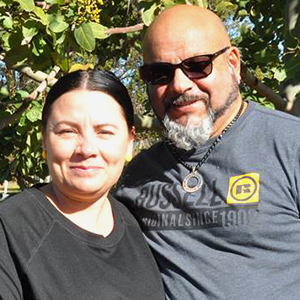“We don’t use the term ‘foster kids’ at our house. We’re all family,” says Dubbo resident Paul Carr.
Being a foster carer changes lives. Paul and his wife Shayne are living proof of that.
The couple, who have two birth children, are foster carers to three children through local Aboriginal out-of-home care agency, Ngurambang.
“For us, the rewards are to see them do well as they grow up,” says Paul.
“You can see the positive changes in them, including behavioural changes.”
The New South Wales Families and Community Services’ care plan study says children who have strong connections with their culture, community and family have higher self-esteem, confidence and expectations of what they can achieve.
“Even things like having a 100% school attendance record for one of our kids is unreal given their history of running out of the classroom within a couple of hours. This shows something is working here,” says Paul.
You can help local Aboriginal children
There is currently an urgent need for Aboriginal foster carers to provide safe and loving homes for young people in the Dubbo area – from Coonabarbran to Condoblin and everywhere in between.
If you’ve ever considered becoming a carer, Uniting can help you take the first step.
You get support from Aboriginal people
Ngurambang – meaning “special place” or “home” in Wiradjuri language – is a local Aboriginal community-controlled organisation, supported by a partnership with Uniting.
Put simply, it’s an Aboriginal organisation, with Aboriginal staff looking for Aboriginal carers to ensure Aboriginal kids remain connected to their culture, country and kin.
You help Aboriginal kids stay together
The approach of having Aboriginal families caring for Aboriginal kids resonated for Paul.
His great grandfather, George, who was born on country at the Springs Property Obley Road, is a descendent of the Dundullimal clan, part of Wilay (brush tail possum people) Wiradjuri.
“I lost my dad when I was young, so it was difficult for me growing up not having a positive male role model in my life,” Paul reflects.
“But my father’s family spent time with me growing up and they are still guiding me today. That connection remains important for me – to spend time with elders to get to know our story.
“Even for Koori kids who can’t be with Aboriginal carers, it’s important that they connect with local elders,” he said.
Within a year of the arrival of their first child via the foster care process – a five-week old boy in 2014 – the Carr family were joined by three of his siblings, now aged 4-11.
For Paul and Shayne, who describe themselves as “a traditional Aboriginal family”, it wasn’t just keeping kids connected with culture that was a high priority, they were also keen to ensure that siblings who were placed into care were not separated from each other.
You get support and training
Paul is full of praise for the process he and Shayne went through with Ngurambang to be assessed as suitable carers.
After completing the necessary police and working with children checks to make sure that kids were going to be in a safe place, the couple were connected with members of the Ngurambang team.
It was this good relationship which cemented the decision he and Shayne made to be carers with Ngurambang.
“They have good people, and provide support and training along the way, including helping to ensure you’re kept up-to-date with training,” said Paul.
“I remember they came to our home over several visits and we related well with them as they talked with us, especially as we shared similar family experiences,” said Paul.
“We also talked about it with our two kids, now 15 and 14. They were absolutely part of that discussion and, like us, they couldn’t wait to grow our family.”
You can change lives
Like Paul, Uniting helps you support local Aboriginal children and make the difference.
Paul says that being a foster carer – like any kind of parenting – can be challenging at times. “But we’re in it for the long haul,” he says.
“My wife’s got a big heart. She’s a busy lady managing multiple school runs, sport in the afternoons and is always cooking and baking. Everyone gets a birthday cake.
You can become a carer
- If you are an Aboriginal person and have considered becoming a foster carer, or would like more information, contact Ngurambang via Uniting on 1800 864 846 or email Uniting.
- Here are the many ways you can be a foster carer.
- There’s an urgent need for foster carers to provide safe and loving homes for young people in the Dubbo area – from Coonabarbran to Condoblin and everywhere in between.
- The type of care varies from emergency and respite care to longer term options, but we do particularly need more people to provide respite care and be short-term carers for adolescents aged 10-14.
- Need more advice? Read Everything you need to know about becoming a foster carer and Debunking the myths: The many ways you can be a carer for more information about the types of carers we welcome and the types of care we offer.
- Find out more about becoming a Foster Carer here






